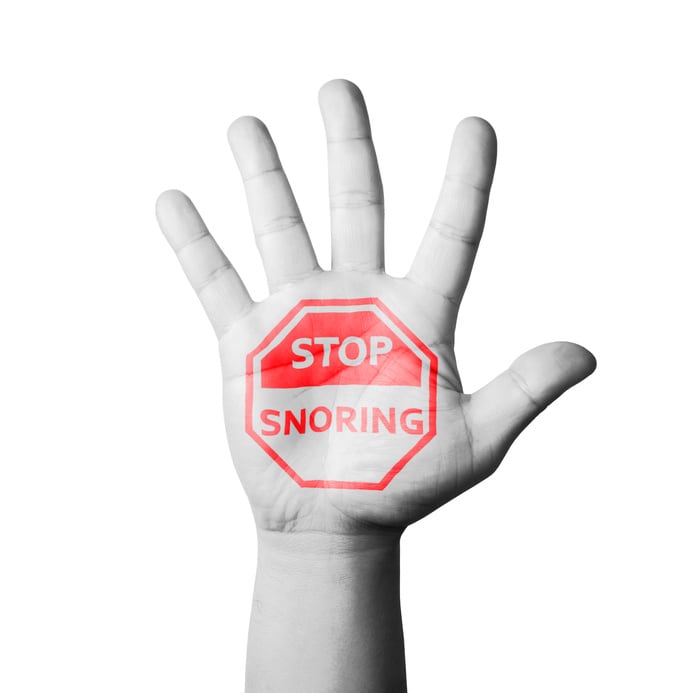5 Tips to Stop Snoring Tonight
 Snoring is commonly defined as breathing with a snorting or grunting sound while asleep. For those who snore or who are subject to listening to someone else snore, this definition doesn't even begin to describe the sound emitted. Snoring can range from a slight "whooshing" sound to a noise not unlike a jackhammer or jet plane. However, it isn't just the sound that can cause issues. Here's an overview of the potential causes of snoring (some of which can be indicators of a more serious health problem) in addition to some useful tips to stop snoring.
Snoring is commonly defined as breathing with a snorting or grunting sound while asleep. For those who snore or who are subject to listening to someone else snore, this definition doesn't even begin to describe the sound emitted. Snoring can range from a slight "whooshing" sound to a noise not unlike a jackhammer or jet plane. However, it isn't just the sound that can cause issues. Here's an overview of the potential causes of snoring (some of which can be indicators of a more serious health problem) in addition to some useful tips to stop snoring.
What Are Common Causes of Snoring?
Snoring can result from a number of different causes. In order to follow the correct tips to stop snoring, it is important to narrow down the cause. This can be done by seeing a sleep specialist for an evaluation. Here are the potential factors that the doctor will be looking for:
- Mouth anatomy - A long soft palate can cause snoring, as can any anatomical abnormalities inside your mouth, such as an elongated uvula. People who are overweight may have extra skin inside their throats that narrow the airway.
- Alcohol – Alcohol relaxes the muscles of the throat. This causes the body to relax its natural defense against airway obstruction and results in snoring if consumed too close to bedtime.
- Nasal problems - A deviated septum, constant nasal congestion or enlarged nasal turbinates can all obstruct the nasal passages and lead to snoring.
- Sleep apnea - This is one of the most serious causes of snoring. When your throat tissues partially, and sometimes completely, cover your airway, this cuts off your normal airflow. A loud snore is often emitted as a strong gust of air tries to remove the obstruction. Sleep apnea can be diagnosed through a convenient home sleep study.
What Are Signs You Might be Snoring?
If you live alone or with another snorer, you may not be aware of the extent of your snoring, but there are symptoms that can be warning signs. If you experience any of the following regularly, having yourself evaluated for snoring is highly recommended:
- Waking up with chest pain
- Excessive daytime sleepiness
- Difficulty concentrating
- High blood pressure
- Gasping or choking at night
5 Tips to Stop Snoring
Depending upon the cause(s) behind your nightly serenade, the following tips may help alleviate some, if not all, of the problem.
- Change your sleeping position. Sleeping on your back is the worst position for snoring. With your head back, the skin in your throat, as well as the tongue and the uvula are subject to gravity pulling them down. This results in a greater likelihood that the airway will become obstructed. Try changing your sleep position to your side to redirect the force of gravity.
- Treat nasal congestion at the first signs. By treating nasal congestion early, you make it possible to keep the air flowing freely through your nose. This eliminates the airway becoming partially obstructed by phlegm. For some people, this may mean regular use of allergy medicine or an expectorant to thin mucus during cold and allergy seasons.
- Avoid snoring stimulators. These include sleeping aids, alcohol or eating too close to bedtime. Alcohol and sleeping aids both cause muscles to relax, resulting in less ability for the throat to perform its job of keeping the airway clear. Eating causes the stomach to expand, lessening room for the lungs to expand and the chance of acid coming back up into the throat is also increased. Studies have actually shown that more strokes happen when people go to bed within an hour of eating, mainly because of airway obstructions.
- Lose weight - Maintaining a healthy weight through diet and exercise has many benefits, and lessening your chance of snoring is one of them. Losing weight will help reduce the excess skin within your throat and less weight and more exercise helps breathing ability.
- Use an oral appliance device - This device is similar to a mouth guard worn during sports. After being examined by a dental sleep specialist, you can be fitted for a custom device that will help keep your airway open. It is an alternative for many who would otherwise need to rely on a CPAP machine.
Stop Snoring and Live Better
A quiet night's sleep is not an impossibility. By following these tips to stop snoring, you can rest well, sleep more deeply and wake refreshed and ready to take on the day. Get started on the road to better sleep and better health by schedule an appointment at eos dental sleep to have your snoring evaluated and to find out whether you’re a candidate for an oral appliance. The good news is that oral appliance therapy is covered by most insurance plans so you can rest assured that your treatment will be affordable.
